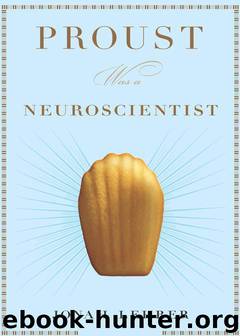Proust Was a Neuroscientist by Jonah Lehrer

Author:Jonah Lehrer
Language: eng
Format: mobi, epub
Tags: Science
ISBN: 9780547394282
Publisher: Houghton Mifflin Harcourt
Published: 2008-09-01T10:00:00+00:00
An annotated score of The Rite of Spring, from the collection of composer Leopold Stokowski. Stokowski would later arrange the symphony for the Walt Disney cartoon Fantasia.
kinds of music—was Stravinsky's enduring insight. When he was first composing The Rite, in Switzerland, testing out its dissonant chords on his piano, a young neighborhood boy got into the habit of yelling, "That's wrong!" at his window. Stravinsky just shrugged. He knew the brain would eventually right his wrongness. The audience would adapt to his difficult notes and discover the beauty locked inside his art. As neuroscience now knows, our sense of sound is a work in progress. Neurons in the auditory cortex are constantly being altered by the songs and symphonies we listen to. Nothing is difficult forever.
The Birth of Dissonance
Igor Stravinsky was born in 1882, the third son of minor nobles. His father was a St. Petersburg opera singer. Although his family insisted that he go to law school, Stravinsky hated law. The legal system embodied everything he found tedious: rules, forms, judges. Suffering through his classes, the young Igor steeped himself in angst. He would later describe his childhood "as a period of waiting for the moment when I could send everyone and everything connected with it to hell."
That moment arrived when his father died. Igor was now free to quit law school. He quickly joined the music academy of Nikolai Rimsky-Korsakov, the only important teacher he would ever have. Like the mature Stravinsky, who made modern symphonies by recycling old folk tunes, Korsakov was a composer defined by his contradictions. He was a Russian nationalist who loved German music, a czarist with a soft spot for the fin-de-siècle.
At the conservatory in St. Petersburg, Korsakov indoctrinated Igor into the anxiety of the modern composer. The problem facing modern music, Korsakov said, was simple: orchestral music had become boring. Wagner's vaunted ambition had been largely replaced by cheerful pastiche, most of it written for the ballet. (In his typical fashion, Wagner blamed this trend on the Jews.) Even more worrying, the modernist revolution seemed to be leaving composers behind. Painters were busy discovering abstraction, but music was already abstract. Poets were celebrating symbolism, but music had always been symbolic. Music could get no grander than The Ring Cycle and no more precise than Bach. The modern composer was trapped by the past. For this reason, the revolution in sound would have to begin with an act of deconstruction. As Wagner had declared half a century earlier when he embarked on his own violent renovation of musical style, "Works of art cannot be created at present, they can only be prepared for by means of revolutionary activity, by destroying and crushing everything that is worth destroying and crushing."*
Download
This site does not store any files on its server. We only index and link to content provided by other sites. Please contact the content providers to delete copyright contents if any and email us, we'll remove relevant links or contents immediately.
When Breath Becomes Air by Paul Kalanithi(7311)
Why We Sleep: Unlocking the Power of Sleep and Dreams by Matthew Walker(5703)
Paper Towns by Green John(4211)
The Immortal Life of Henrietta Lacks by Rebecca Skloot(3861)
The Sports Rules Book by Human Kinetics(3631)
Dynamic Alignment Through Imagery by Eric Franklin(3524)
ACSM's Complete Guide to Fitness & Health by ACSM(3494)
Kaplan MCAT Organic Chemistry Review: Created for MCAT 2015 (Kaplan Test Prep) by Kaplan(3453)
Introduction to Kinesiology by Shirl J. Hoffman(3330)
Livewired by David Eagleman(3174)
The River of Consciousness by Oliver Sacks(3026)
The Death of the Heart by Elizabeth Bowen(2942)
Alchemy and Alchemists by C. J. S. Thompson(2936)
Descartes' Error by Antonio Damasio(2776)
Bad Pharma by Ben Goldacre(2757)
The Gene: An Intimate History by Siddhartha Mukherjee(2526)
Kaplan MCAT Behavioral Sciences Review: Created for MCAT 2015 (Kaplan Test Prep) by Kaplan(2512)
The Fate of Rome: Climate, Disease, and the End of an Empire (The Princeton History of the Ancient World) by Kyle Harper(2465)
The Emperor of All Maladies: A Biography of Cancer by Siddhartha Mukherjee(2464)
